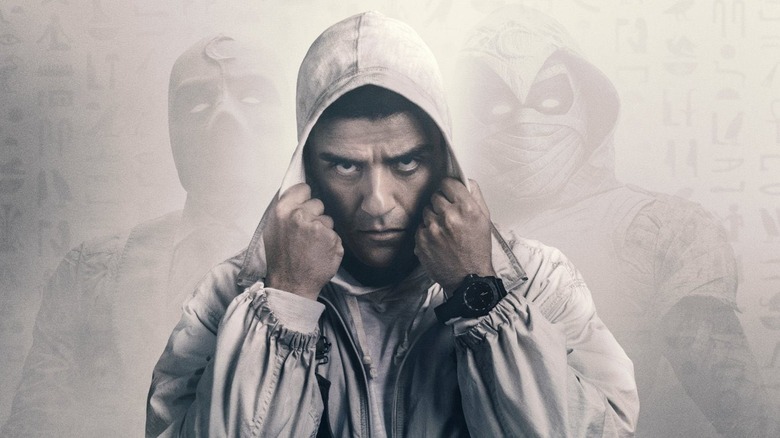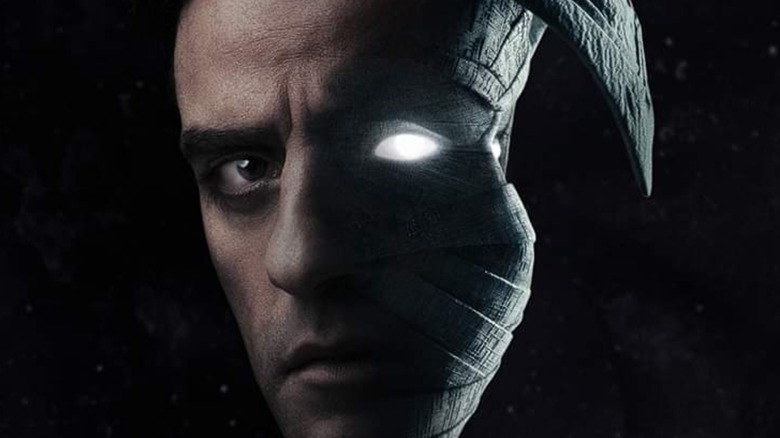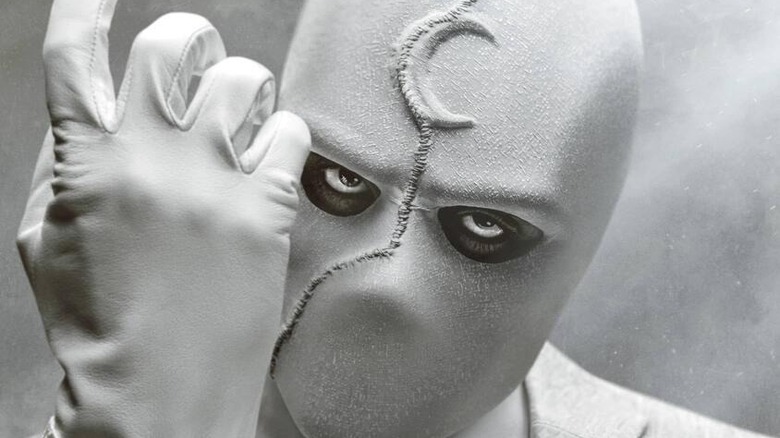Which One Of Moon Knight's Identities Is Real? It's Complicated
The protagonist of Marvel's "Moon Knight" is a bumbling museum gift shop employee who is considerate of others to a fault, loves to geek out about Egyptian mythology, and cannot get a date. He is also a fearless killer, an agent of Khonshu's justice, and can ask women out with ease.
They're the same person, so why do they have different names? Why are their personalities so different? And which one of them is the "real" identity?
Well, like the headline says ... it's complicated.
One person, fractured
Dissociative identity disorder is more commonly known as "multiple personality disorder" (it's also often erroneously referred to as schizophrenia, which is something entirely different). "Multiple" describes what people see on the outside; they see what appears to be multiple different personalities in the same body, each taking their turn at the front. But what the person experiences internally is actually more of a splitting or fracturing. Once you understand the difference, it becomes a lot easier to understand the journey from one personality into two, or many, when looking in from the outside.
Dissociation comes about as a result of interacting with other people and existing in a society that has expectations of us — some reasonable, some unreasonable. For example, it's a reasonable expectation that we should be considerate of other people, so while a five-year-old might run around a restaurant shrieking and pretending to be a pirate, by the age of 18 they'll (hopefully) have learned that kind of behavior is disruptive to other people and they should restrain their pirate-y impulses so that people can eat their meals in peace.
That's a reasonable expectation, and people can learn to curb those impulses through teaching (their parents explaining to them that they should restrain themselves in restaurants) and also through empathy: They notice that they get annoyed when they're trying to have a nice meal and someone is making a loud noise, and so they reason that other people might be annoyed by loud noises as well, and therefore they should talk softly when they're out for a meal in a nice restaurant. This social filter is an important part of finding a compromise between our own needs and other people's needs. In a noisy bar, we talk loudly. In a library, we talk in whispers. People are constantly mirroring one another and adapting their behavior to different situations.
But sometimes the world presents us with unreasonable expectations. A young boy who is scolded for crying and is told that "boys don't cry!" is being presented with an unreasonable expectation. He can't rationalize his way through it, so he simply plasters a mask over the part of himself that wants to cry. But, returning to the restaurant analogy, telling the boy "boys don't cry!" is like responding to the hyperactive restaurant child by telling them, "never make a noise again for the rest of your life!" It's just not a reasonable request. The social filter is like a rubber band — it can stretch, and can even stretch a long way, but if you stretch it too far, and there's too much conflict between who you are and what's expected of you ... something's going to snap.
In "Moon Knight," Marc Spector and Steven Grant are extremely different people. Marc Spector is a lethal weapon of Khonshu's justice; Steven Grant is a nice British man who works in a museum gift shop. Where Marc is absolutely fearless, Steven appears to be a total coward. That's because, in order to become fearless, Marc had to completely suppress his fear — a completely unreasonable expectation of anyone. Steven Grant is a compromise that emerged as a result of Marc suppressing any emotion or behavior that he felt was incompatible with the person he needs to be: he can't suppress them all the time, so instead Marc sometimes takes a nap and simply ... lets Steven be all of those things for him.
It's because of this that Marc cannot simply take over from Steven and kill that part of his mind, and it's also why Steven can't escape Marc after meeting him, no matter how fast he runs. When Steven tries to flee Marc, what he's effectively doing is running around and around and around inside his own brain.
So ... which one is real? Marc or Steven?
The problem with this question is that it's fixated on the names of the two personalities, and names are exclusively the realm of our personalities, not our underlying identities. Nobody is born with a name; they're given a name by their parents, and they eventually come to associate their identity with that name. To borrow a little wisdom from the Barenaked Ladies...
When I was born, they looked at me and said
"What a good boy, what a smart boy, what a strong boy"
And when you were born, they looked at you and said
"What a good girl, what a smart girl, what a pretty girl"
We've got these chains hanging around our necks
People want to strangle us with them
Before we take our first breath
Later in the song, the lyrics refer to the narrator's name as a "hairshirt" — something that technically fits but was not designed to be comfortable to wear, and which (in the narrator's case) is itchy and uncomfortable, irritating the skin until eventually it causes a rash. At this point in the show, we don't know whether "Marc Spector" was the name that our leading man was given when he was born, but it is implied that the Steven Grant personality emerged after the Marc Spector personality. That doesn't mean that Steven is less real than Marc, any more than holding back tears makes sadness not real. It means that the people who think they know Marc have never actually met the "real" person; they've only seen one side of that person.
This is true of most of us. The way we behave when we're alone is different to how we behave around other people — that's the social filter in action. If the expectations that the world places on us are reasonable, we can slip between personalities pretty easily, and we all have multiple personalities for different situations.
At work, we have a professional personality. On dates, we have a flirty personality. Siblings who spent most of their time together as kids, but then grew apart as adults, will revert to immature behavior like pranks and play-fights when they get together at Christmas — even when they're grown adults with families of their own and very sensible jobs — because the personality that they formed from interactions with their siblings was mostly formed while they were young. Employees who work for a very strict, no-nonsense boss would probably be confused to see him flicking peas at his brother across the kitchen table during Thanksgiving, or wrapping his mother up in a great big hug, because they've never seen his "family" personality before. If he let his family personality loose while he was at work and went around hugging random employees and flicking peas at people during meetings ... well, that would be a problem.
This is also why, when you're a kid, seeing teachers "out in the wild" doing normal stuff like shopping for groceries feels very bizarre, even though logically you know that teachers must have to eat sometimes. You've only ever seen your teacher as "Mrs. Krabappel," not as "Edna-who-needs-to-buy-groceries." She's still physically the same person you saw earlier, but when she's not in "teacher mode" her personality may be drastically different.
A large room with lots of corners
We create new personalities all the time. Every time we start a social media account, we create a new, slightly distorted picture of ourselves according to the culture of the social media platform. A person might have an Instagram account full of photos of them relaxing on beaches and standing on top of mountains, and then a Twitter account full of seething political rhetoric. They're the same person, simply adapting to different environments online in the same way that they adapt in the real world.
In "Moon Knight," Marc/Steven has compartmentalized the different parts of his identity to such an extreme that they can no longer co-exist under a single name. He can't be standing in one room as Marc-the-lethal-killer and walk through a doorway and be Marc-the-silly-nerd. It's an unreasonable expectation, like telling men that they can never, ever, ever cry. So instead the silly nerd gets his own name and backstory and identity and even his own accent, and he transitions from Steven to Marc (and vice versa) via the doorway of sleep.
Picture Marc and Steven as roommates. Marc is very neat and tidy, Steven is very messy, and because of this they drive each other absolutely insane. Steven just wants to relax and throw his bag on the floor when he walks in at the end of the day, but when he goes to find his bag, Marc has put it up on the hook. Meanwhile, Marc prefers the floor kept clear of clutter, and Steven dropping his clothes on the floor makes him apoplectic. Marc shouts at Steven, Steven shouts back at Marc, and all of this shouting makes their living situation extremely unpleasant.
Finally, one day, Marc says, "enough!" He grabs a bit of chalk and draws a line down the middle of the room. He points to one half of the room and says, "Steven that's your side, and this is my side. I can be as neat as I like on my side, and you can be as messy as you like on your side." It's not a perfect system. But it works.
Just as we all have numerous sides to our own personalities, it's safe to assume that there are more personalities within Moon Knight than just Steven and Marc. By the end of the first episode, we get to see the chalk lines that divide those two. But the mind is a very large room with lots of corners, so there are probably other sections to the room that we haven't seen yet, and which will reveal themselves as the series continues.
"Moon Knight" is now streaming on Disney+, with new episodes releasing every Wednesday.



